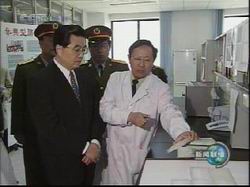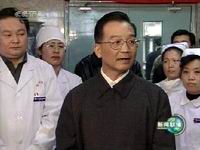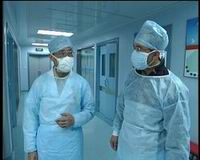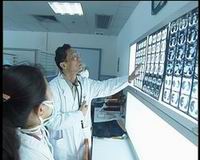 |
|
Anti-SARS, top priority of Chinese government |
|
 |
|
Since mid-April this year, both the number of deaths from SARS and confirmed SARS patients rose in appalling numbers in China, especially the country’s capital Beijing. Consequently, the anti-SARS campaign led by the Chinese government has entered a more urgent stage.
Three months after the outbreak of SARS in China, the Chinese government has kicked off an all-out campaign against the fatal disease. What draws the most attention from both the country and abroad might be the gestures posed by the top leaders who keep pumping confidence into the mass people while speeding up the anti-SARS endeavors more extensively and more openly.
With the anti-SARS battle going on a wider range in China, it is likely that both pressure and encouragement will combine to act as important factors testing the Chinese government. But at any rate, China is doing its utmost to contain the spread of the deadly disease through means of both administrative power and medical science. The goal is to decrease as much impact on the domestic economy and foreign confidence in China as soon possible.
Carry out the guideline set by the central government so as to win the battle against SARS”--this slogan posted in many government departments defines the heightened disease situation in China and consequent anti-SARS efforts led directly by the country’s top leaders.
 Chinese president Hu Jintao inspected a Military Institute of Medical Science and another Gene Group Research Institute of the Chinese Academy of Sciences in Beijing on April 20, showing the attitude of the government that it is staying side by side with all the people engaged in the anti-SARS battle at a time when a sharply increased number of deaths from SARS and confirmed SARS patients are being officially reported. With the company of some high-level government officials, Hu entered the lab where research relating to the SARS virus have been being conducted and met the researchers devoting themselves to this hard work. He raised several questions concerning the process of stringent medical research and the safety situation of researchers exposed to some infectious materials. He offered encouragement to them by promising full fiscal backup from the central government for relevant research and development work. Meanwhile, he reemphasized the government’s top priority concerning medical work, which is underlined by finding a cure to help patients recover from SARS as soon as possible.
Chinese president Hu Jintao inspected a Military Institute of Medical Science and another Gene Group Research Institute of the Chinese Academy of Sciences in Beijing on April 20, showing the attitude of the government that it is staying side by side with all the people engaged in the anti-SARS battle at a time when a sharply increased number of deaths from SARS and confirmed SARS patients are being officially reported. With the company of some high-level government officials, Hu entered the lab where research relating to the SARS virus have been being conducted and met the researchers devoting themselves to this hard work. He raised several questions concerning the process of stringent medical research and the safety situation of researchers exposed to some infectious materials. He offered encouragement to them by promising full fiscal backup from the central government for relevant research and development work. Meanwhile, he reemphasized the government’s top priority concerning medical work, which is underlined by finding a cure to help patients recover from SARS as soon as possible.
“It is greatly expected that you can uncover the answer to the riddle of SARS as soon as possible. Thus, we will have a better basis on which research and development of some specific medicines and vaccines can proceed successfully,” said the President.
In mid-April, President Hu flew to southern China′s Guangdong province where the first SARS case was reported for an inspection of the disease situation there as well as the emergency measures taken by the local government and medical departments.
On April 12, he met the visiting Chief of the Hongkong Special Administrative Region, Tung Chee Wah, and expressed the great attention that the central government has been paying on the impact exerted by SARS in Hongkong.
Hu also visited the Disease Prevention and Control Center in Guangzhou and addressed the staff.
“After the outbreak of SARS in some areas of Guangdong province, speaking directly to you, we feel pain within our hearts. On the one hand, we’re worried about the health of the mass of people and their personal safety which is seriously threatened by SARS. On the other hand, we taste relief by witnessing the great deal of strenuous and careful work by a large number of workers in the health departments and hospitals as well as consequent quick recovery of some SARS patients,” the President added in his address.
 At the same time, Chinese Premier Wen Jiabao is busy at another forefront of the combat against SARS, Beijing. Since early April, Wen visited Beijing You′an Hospital and the Disease Prevention and Control Center, meeting doctors, nurses and biochemical workers. He extended sincere appreciation to all people fighting at the medical front of the anti-SARS battle during brief yet cordial conversations with some of the working staff.
At the same time, Chinese Premier Wen Jiabao is busy at another forefront of the combat against SARS, Beijing. Since early April, Wen visited Beijing You′an Hospital and the Disease Prevention and Control Center, meeting doctors, nurses and biochemical workers. He extended sincere appreciation to all people fighting at the medical front of the anti-SARS battle during brief yet cordial conversations with some of the working staff.
 On April 18, Wen went to some kindergartens, schools and universities, where he met the teachers and students in classrooms, dormitories and libraries, asking for some information concerning SARS precautionary measures and the relevant situation.
On April 18, Wen went to some kindergartens, schools and universities, where he met the teachers and students in classrooms, dormitories and libraries, asking for some information concerning SARS precautionary measures and the relevant situation.
“Fellow students, please take it easy. The CPC and the government must stay together with the masses in solidarity, making devoted efforts, paying respect to science, relying on science and reinforcing precautionary measures. We’re determined to win the anti-SARS battle,” Wen said to students.
Apart from going to the grassroots units, a series of high-level meetings have been held in many government departments, some of them chaired by Premier Wen Jiabao. They are aimed at stepping up concrete measures for prevention of the further spread of SARS and the easing of the panic flourishing in some places. Besides, removals and appointments of the officials in certain key positions in the central and municipal governments. This turns out to be persuasive evidence to the masses and overseas critics of the resolution of the Chinese government in the difficult and must-win combat against SARS.
Medical staff on anti-SARS frontline
Medical workers from the Guangzhou Institute of Respiratory Diseases put their heart and soul into combating SARS, the killer disease.
In face of the sudden occurrence of atypical pneumonia cases, medical workers require not only medical skills and experience, but courage as well. SARS is deadly epidemic. In the past several months, the 160 medical workers of the Guangzhou Institute of Respiratory Disease have helped many patients recover and be discharged from their hospital. They put aside their personal health and rest and gave their best in combating the disease.
 There are in fact many similar stories happening everywhere there are doctors and patients. With medical workers at the front doing their research and treatment and ordinary people becoming aware of the harmfulness of the epidemic disease, as long as the monitoring system is established and effective control and preventive measures taken, we can certainly eliminate or control its spread and prevalence.
There are in fact many similar stories happening everywhere there are doctors and patients. With medical workers at the front doing their research and treatment and ordinary people becoming aware of the harmfulness of the epidemic disease, as long as the monitoring system is established and effective control and preventive measures taken, we can certainly eliminate or control its spread and prevalence.
Since the first outbreak of SARS in Guangdong province at the beginning of this year, the Guangzhou Institute of Respiratory Disease has accepted over 70 severely affected patients and is regarded by many as a “forbidden zone”. Inside the Intensive Care Units (or ICU) of this Institute, it is so quiet that even the breathing of the patients is audible. Medical staff here work unperturbed; supervision and treatment are going on in an orderly manner.
 The one checking the medical records is Mr. Zhong Nanshan, 67, head of the anti-SARS medical team in Guangdong Province and academician of the Chinese Academy of Engineering. He has played an irreplaceable role in diagnosing and treating SARS patients.
The one checking the medical records is Mr. Zhong Nanshan, 67, head of the anti-SARS medical team in Guangdong Province and academician of the Chinese Academy of Engineering. He has played an irreplaceable role in diagnosing and treating SARS patients.
“We accepted the first SARS patient around the end of January. He was badly affected at the time, with great difficulty breathing, cyanosis, and low oxygen. We treated him as an ordinary pneumonia patient at first without any sign of recovery and then turned to artificial breathing apparatus. Quite to our dismay, we found his lung tough with very low flexibility while the artificial breathing machine was in use. The traditional way of aerating made both the lungs pneumothorax,that is to say, the two lungs tended to burst. We soon adjusted the parameter and continued with the treatment. We began to doubt that the patient was an ordinary pneumonia case. It was very special acute lung damage, named ARDS in medical terminology. We tried to use large doses of cortical hormone in our treatment. The patient felt better the next following two days; he didn’t find it that difficult to breathe. We sensed then that it was an unusual disease,” Zhong, director of Anti-SARS Medical Team, Guangdong Province, recounted the treatment of the first patient in his institute.
When the disease reached its maximum severity in Guangdong Province, the Guangzhou Institute of Respiratory Disease admitted 43 critically ill patients; the 16 beds in ICU were all taken. Mr. Zhong Nanshan volunteered to transfer all severely affected SARS patients from other hospitals.
“I regard this as the obligation of our institute. The Guangzhou Institute of Respiratory Disease undertakes research in respiratory diseases, particularly, the treatment of respiratory failure. We are quite successful in this regard. What is going on is mainly a respiratory disease, and that is our specialty. This is the main reason. Secondly, I have full confidence in my staff and colleagues. They are very experienced and responsible. We must assume responsibilities in this job. Like, we have a mine sweeping team, and the present task is to sweep all the mines. Who will go if you don’t? So that is our job. Thirdly, I was thinking it is in fact an opportunity to make improvement in our specialty. Everyone is doing his or her part in diagnosing and treating the new disease; and I think it is also an academic contribution,” Zhong added.
All the medical workers at the ICU have to have close contact with the dangerously ill SARS patients. Every one is well aware of the danger involved in his or her job.
Li Yimin, doctor of Guangzhou Institute of Respiratory Disease, said: “They all know that the critically ill patients are strongly infectious. Once you carry the stretcher or put the breathing apparatus into the patients’ nose or take care of them, you are highly likely to get infected. But here on the spot, no one is taking all these dangers into account.”
Going ahead despite the risks was the decisive choice of the 80 plus medical workers here at the ICU in their efforts to combat the killer disease. One doctor named Liu Xiaoqing was in charge of a severely affected patient. He had passed his disease to a dozen persons before he was taken to ICU. Doctor Liu carried the stretcher herself for the patient to transfer here and receive emergency treatment.
“The patient was there waiting to be transferred to our hospital. He would have had no chance to get cured if there were no one around and missed the opportunity,” Liu said.
“Were you not afraid?” asked the reporter.
“No, not at the moment,” answered Liu, stoutly.
Doctor Liu had no time of think of fear in that urgent situation, but misfortune occurred. She got infected herself! She once again took to her post after proper treatment. In fact, about 20 medical workers have been infected since February. One doctor fell, another took his place. All the medical staff in the ICU as a team put their heart and soul into combating SARS.
A medical staff told the reporter, “I’ve not been home since Spring Festival. We are germ carriers; we’ve always been in the hospital. Many of our patients were seriously affected, many of them. We’ve been in very close contact with the patients, as you can see, helping them with their sputum, daily care etc. We have protected ourselves from being infected, but probably we will pass the germs to our family members if we go home. They may have the chance of being infected. So we haven’t gone home. We are thinking that if we get infected, the virus has to stop here and not spread to others.”
In order to take good care of the SARS patients, the medical workers have time to think of neither their health nor rest. Overtime is a common practice among this crew. With their efforts, many of the seriously affected patients recovered and have been discharged from the hospital. One man who has already recovered was once infected with SARS and lapsed into a deep coma. When he got better and was transferred to the regular ward, he found that the doctor who treated him was infected and in the same ward with him.
“When I was leaving the hospital I went to him and told him, with a deep feeling, that I wished him to recover soon. This is a heart felt wish for doctors who got infected for their patients′ sake,” a recovered SARS patient said, moved.
|
| - Back - |
|
 |